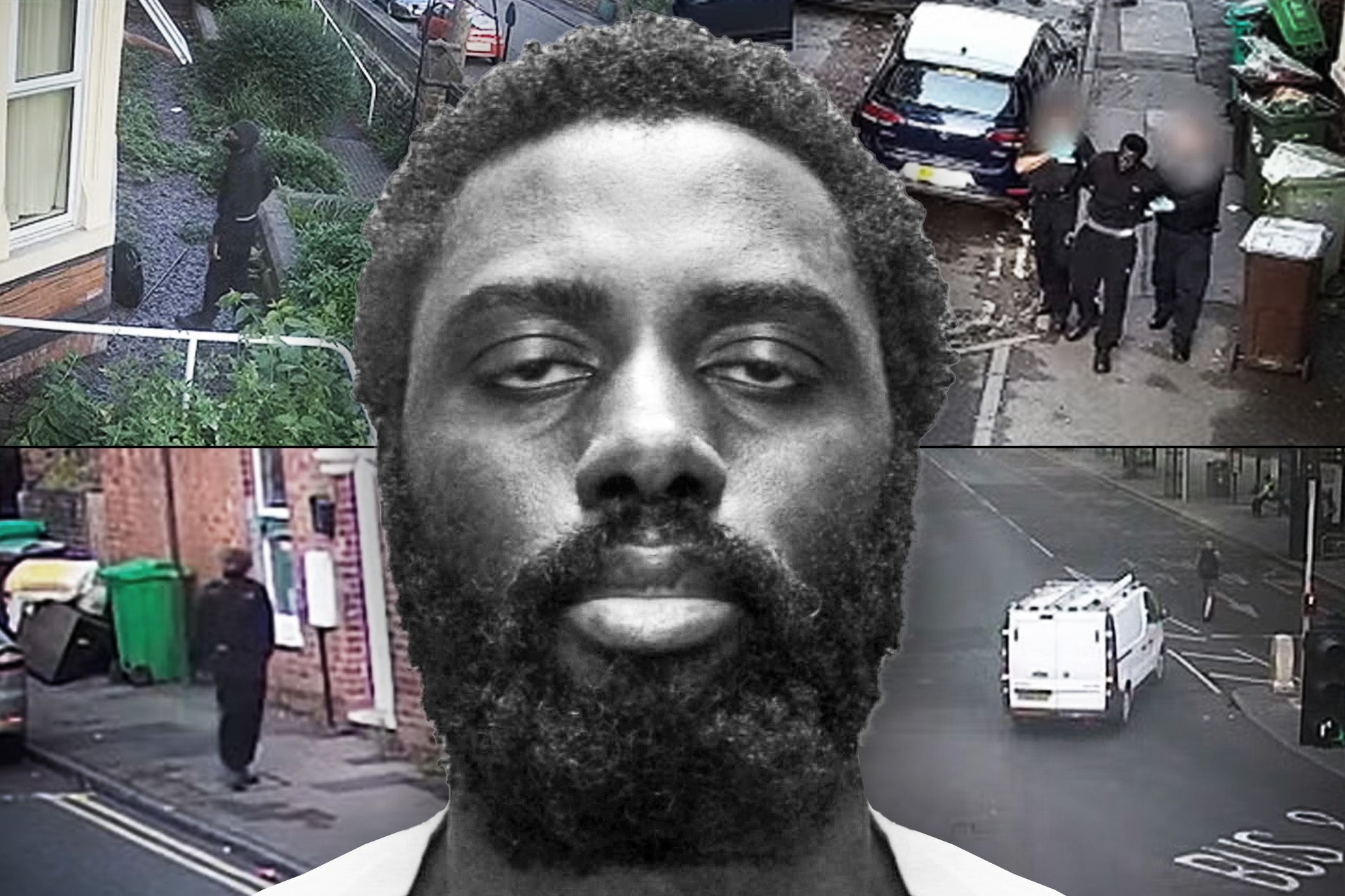Revealed: failures at NHS hospital that left Nottingham triple killer free
Hospital was warned over ‘systemic failings’ years before patient’s random stabbing spree
Failures by the NHS trust responsible for treating Nottingham knife killer Valdo Calocane have been laid bare by the health watchdog – but The Independent can also reveal the hospital was repeatedly warned about poor care and experienced a steep rise in patient deaths over the last decade.
An investigation into mental health services in Nottinghamshire found that deaths of vulnerable patients in the years leading up to Calocane’s release from their care more than doubled from 1,694 in 2014-15 to 4,149 in 2021-22.
Calocane, a paranoid schizophrenic, stabbed 19-year-old students Barnaby Webber and Grace O’Malley-Kumar as they returned from a night out in June last year, before going on to kill 65-year-old Ian Coates.

A damning report into his care, published on Tuesday by the Care Quality Commission (CQC), found the trust’s mental health unit “minimised or omitted” key details of the serious risk he posed to others.
The families of his victims said services caring for him in the lead-up to the attacks “have blood on their hands”. In response, the Department of Health has confirmed there will be a public inquiry into the failings in Calocane’s care.
The CQC report found:
- Calocane persistently refused to take his medication
- He became increasingly violent when his psychosis was not managed properly
- He underwent eight separate risk assessments by the trust but was still released into the community
- Calocane’s discharge back to his GP was authorised despite evidence he was a risk to others
The CQC findings come as an investigation by the magazine The Doctor, shared exclusively with The Independent, reveals Nottinghamshire Healthcare NHS Foundation Trust has received dozens of warnings since 2014-15 from coroners highlighting failures following the deaths of its patients.
The investigation found that concerns about the trust’s services – many similar to those in the CQC findings – have been raised repeatedly for several years and local experts say insufficient action has been taken and lessons are not being learnt.
Figures, obtained by The Doctor via the Freedom of Information Act, reveal the trust was issued with 11 prevention of future deaths reports in 2023-24.
In comparison, annual figures were between zero and three for the prior nine years – totalling 16.
Have you been impacted by this story? email rebecca.thomas@independent.co.uk

The data also shows deaths of patients while under trust care rocketed from 1,694 in 2014-15 to 4,149 in 2021-22 – a 145 per cent increase.
In 2022-23, 2,542 deaths were recorded and 1,547 in 2023-24, although the figures cannot be compared to previous years as the trust did not include “natural deaths”.
The investigation comes after The Independent revealed earlier this year that more than 30 members of staff at one of the trust’s main sites, Highbury Hospital, where Calcone was admitted, were suspended over allegations of serious misconduct including the falsification of mental health observations and maltreatment of patients. The trust has since concluded an investigation but has refused to say how many staff were dismissed.
‘Defensive attitudes’
When Sally Baylis met the staff who had been responsible for looking after her husband, Ken Baylis, she assumed his death was just “unfortunate” and simply wanted to know how he had been in the hours leading to his passing – but she said their “defensive” attitudes quickly revealed his care had been “a mess”.

Ken Baylis, 67, was an inpatient at Millbrook mental health unit in Sutton-in-Ashfield and had been allowed to take unescorted leave from the unit, without the knowledge of his family. He stepped in front of a bus and died that day – 23 January 2023.
Despite a history of depression and repeated – serious and escalating – suicide attempts during the 14 months before his death, staff had failed to recognise the risk of him taking his own life.
Coroner Elizabeth Didcock issued a prevention of future deaths report to Nottinghamshire Healthcare NHS Foundation Trust following an inquest into the death of Mr Baylis.
She described a failure to recognise a building picture of increasing risk of suicide, to involve his family in planning, and to produce an inadequate risk assessment, as well as unchallenged reporting of Mr Baylis’s apparent lack of suicidal thoughts.
Ms Baylis said these “omissions in care” made a contribution to his death.
Mr Baylis was an avid music lover described by his widow as a one-off, defined by his sense of humour – someone who was “such fun to be around”.
The Independent revealed earlier this year that another man, Daniel Tucker, 24, took his own life just hours after being discharged from Highbury Hospital.

Following Calocane’s conviction, former health secretary Victoria Atkins asked the CQC to carry out an urgent review into potential failings by Nottinghamshire Healthcare.
The first part of the review in March of this year warned of failures to manage demand for services, access to care, staffing and issues of leadership.
The latest review by the watchdog, published on Tuesday, reveals a catalogue of errors from the trust.
The Doctor found similar themes following a review of prevention of future death reports from coroners. In 2017 and 2020, concerns were raised about failures to engage with the families of patients. One of the cases raised concerns about inadequate risk assessments.
A coroner’s warning in 2020 reveals that following a patient’s death, the trust included “many false and inaccurate statements in its investigation into the care of a patient”.
It was also criticised for one of its crisis teams’ gatekeeping services and considering its role to be “limited to avoiding the need for patients to receive inpatient treatment”.
In 2021 the trust was criticised in a coroner’s report for the rejection of referrals and missed opportunities to intervene before a patient’s overdose.
Prevention of future deaths reports repeatedly reference shortcomings in risk assessments and a failure to properly involve families.
Nottingham GP Irfan Malik said: “If you look at inquests, the themes are repeated over and over again. We’ve almost given up and lost hope that there will be any change.
“We’ve got used to services being inaccessible and poor.”

One senior clinician at the trust told The Doctor there are frequent complaints about access and that new patients find themselves behind people known to services in the queue for help.
They said support offered now has to be more tightly managed and shorter in duration due to vast waiting lists, impacting quality of care.
Another member of staff at the trust claimed they were treated as a “thorn in the side” if they raised concerns.
Nottingham City health scrutiny committee chair Georgia Power warned the trust three years ago that access to care was already a “systemic issue” but said she was viewed as a problem when raising concerns.
According to Cllr Power, repeated warnings about care and leadership were sent to the trust for over four years.
Nottinghamshire Healthcare’s executive medical director and deputy chief executive, Dr Susan Elcock, said: “As a senior leadership team, we recognise the need to bring about sustained change in the quality and safety of care we deliver and importantly in our culture, as we move towards being an organisation focused on learning and continuous improvement.”
She said the trust has launched an improvement plan to deliver long-term sustainable improvement for patients, which includes reviewing the capability and capacity of its leadership and greater clinical input.
The trust also holds monthly forums for staff to ask questions and raise concerns anonymously.
She added: “Ultimately, while we know we have our challenges, as an organisation we are committed to engaging with and involving colleagues, patients, their families and our local communities as we make the improvements needed to ensure we consistently deliver high-quality patient care.”
Amanda Sullivan, chief executive of NHS Nottingham and Nottinghamshire Integrated Care Board, said: “We are committed to safe and high-quality services for our communities and the oversight of Nottinghamshire Healthcare Trust is one of our key priorities.”
She said it has continued to work with the trust and instigated enhanced surveillance on a broad range of quality concerns and improvement plans.
If you are experiencing feelings of distress, or are struggling to cope, you can speak to the Samaritans, in confidence, on 116 123 (UK and ROI), email jo@samaritans.org, or visit the Samaritans website to find details of your nearest branch. If you are based in the USA, and you or someone you know needs mental health assistance right now, call or text 988, or visit 988lifeline.org to access online chat from the 988 Suicide and Crisis Lifeline. This is a free, confidential crisis hotline that is available to everyone 24 hours a day, seven days a week.
If you are in another country, you can go to www.befrienders.org to find a helpline near you.
Subscribe to Independent Premium to bookmark this article
Want to bookmark your favourite articles and stories to read or reference later? Start your Independent Premium subscription today.


Join our commenting forum
Join thought-provoking conversations, follow other Independent readers and see their replies
Comments